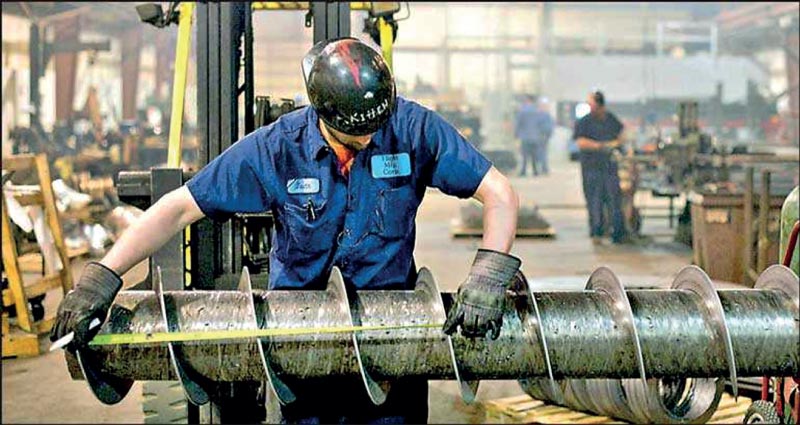Saturday Feb 21, 2026
Saturday Feb 21, 2026
Monday, 30 December 2024 00:00 - - {{hitsCtrl.values.hits}}

Industrialisation is the only way forward
 Speaking in Parliament on 18 December, President Anura Kumara Dissanayake pledged that under the leadership of his party, “we will never allow a situation like 2022-23 to reoccur in our country”. If AKD and the National People’s Power (NPP) intend to keep this promise, they will have to get a lot more serious about industrialising an economy dependant on services and remittances.
Speaking in Parliament on 18 December, President Anura Kumara Dissanayake pledged that under the leadership of his party, “we will never allow a situation like 2022-23 to reoccur in our country”. If AKD and the National People’s Power (NPP) intend to keep this promise, they will have to get a lot more serious about industrialising an economy dependant on services and remittances.
It is regrettable that the President’s speech, while announcing welcome relief for the poor through tax cuts, allowances and subsidies, paid scant attention to increasing investment in the real economy. This is a deadly trap that centre-left governments often fall into. Naturally, the wretched conditions following economic collapse require immediate relief measures. However, long term increases in consumption can only be achieved through investment in the real economy.
A long time coming
There have been a multitude of interpretations of the root causes of the economic crisis in 2022-23 which led to hours-long blackouts, acute shortages of fuel and cooking gas, a devaluation of the rupee, and soaring inflation. The mainstream explanation has focused almost exclusively on the Government’s budget deficit, and the Central Bank’s financing of it. The reality is that this crisis was a long time coming, rooted in the country’s fundamentally colonial economic structure that is dependent upon tourism, remittances, and low-value-added exports.
Historically, a strong focus on value-added manufacturing has been the only way for countries to sustain rapid growth levels, develop indigenous technology, and uplift the living standards of the majority of people. The only exceptions to this rule are small countries that are either rich in natural resources (e.g. UAE, Qatar, etc.) or function as tax havens and centres for financial services (e.g. Luxembourg, Ireland, etc.). With a population of 22 million—comparable to Syria, Burkina Faso, or Chile—Sri Lanka is hardly a ‘small country’. Uplifting our large rural population requires industrialisation.
In the lead up to the 2024 elections, one of the NPP’s most articulate voices for industrialisation was Chathuranga Abeysinghe, now serving as Deputy Minister of Industries and Entrepreneurship Development. Abeysinghe has often made sensible points about the need for state-ownership of energy and finance, combined with support for technology transfer and upgrading, to jump start the process of industrialisation. However, his eclectic choice of benchmarks countries, including India, China, Malaysia, and Vietnam, is confused at best.
China and Vietnam are socialist countries ruled by a Communist Party. These countries derive legitimacy from the reproduction and growing productivity of an industrial working class. Meanwhile, India and Malaysia feature a relatively strong class of industrial capitalists, who have a vested interest in the perpetuation of interventionist industrial policies. Sri Lanka is unlike both of these, being a liberal democracy dominated by merchant capital (business interests invested in sectors such as trade, finance, and real estate).
Industrialisation as class struggle
Setting on a path of industrialisation would necessarily bring any government in Sri Lanka on a collision course with the interests of merchant capital. There can be no industrialisation without tackling parasitic interests in the economy, including the likes of predatory financial services, agricultural middle-men, and import mafias. These domestic interests function as fronts for large-scale multinational companies which seek to keep countries in the Global South as captive markets.
There may be ways to peacefully convert at least some factions of merchant capital into industrial capital. South Korea was able to convert its landlord class into an industrial capitalist class through extensive land reforms which redistributed land to the tiller while compensating the landlords with bonds that were reinvested in industry. The challenge for NPP policy makers is to devise incentive structures to direct investment into strategic manufacturing sectors that can deliver long term productivity gains.
Industrialisation is no easy task. The interests opposed to it often cloak themselves in humanitarian concern for workers and the environment. Yet the reality is that industrialisation is most oppressive for a business class used to making easy money through trade, finance, real estate, and tourism. Operating a factory, managing scores of workers, competing with international standards, and innovating new products and process will demand much more from our private sector than they are used to. This is precisely why the State, helmed by a political party dedicated to the cause, is needed to drive this process.
Industrialisation as anti-corruption
For better or worse, the NPP’s electoral campaign about corruption and system change captured the imagination of large swathes of the electorate, helping them win both the Presidency and a supermajority in Parliament. However, more work needs to be done to unravel the structural causes of so-called corruption and the exact nature of the system that holds Sri Lanka down.
At Tricontinental: Institute for Social Research, we recently published a dossier titled, “How Neoliberalism Has Wielded ‘Corruption’ to Privatise Life in Africa”. Here, we pointed out how the role of the private sector in corruption is avoided or minimised by official definitions of corruption. The biggest losses of revenue for countries in the Global South are not from petty bribery by government officials, but large-scale drain of finances through practices such as tax evasion, transfer pricing, and trade misinvoicing.
In the case of Africa, investment into extractive sectors significantly increases the opportunity for private sector corruption and opaque pricing practices. In the case of Sri Lanka, it is our dependency on food and energy imports, and reliance on low value-added exports, that is conducive to private sector corruption. In such a pattern of (under)development, there is hardly any need for capitalists to reinvest profits into developing a domestic industrial ecosystem.
If the NPP wants to fulfil its mandate of anti-corruption and modernisation of the country, and if it wants to prevent an economic crisis akin to what occurred in 2022, industrialisation is the only way forward. There is no alternative.
The writer is a researcher at Tricontinental: Institute for Social Research. He has an MSc in Economic Policy from SOAS University of London. He can be reached at [email protected].)